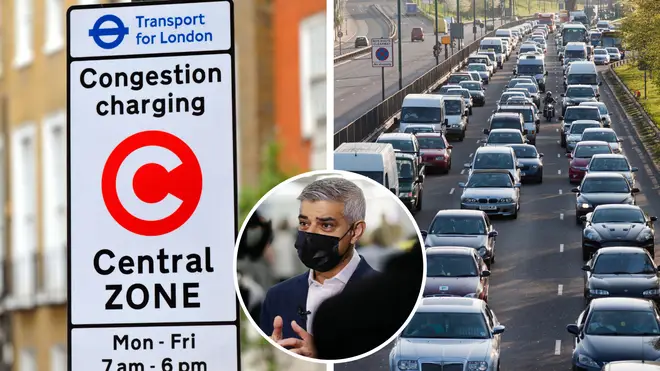
Ian Payne 4am - 7am
18 January 2022, 00:01 | Updated: 29 January 2022, 12:47

Drivers in London could be slapped with more charges under plans being considered by Sadiq Khan to reduce car use in the capital - including a charge per mile driven.
New research has found car traffic in London must be cut by 27 per cent within eight years in order to meet the capital's target of being net-zero by 2030.
The Labour mayor said he is "not willing to put off action" designed to encourage people who drive petrol or diesel cars to switch to public transport, walking, cycling or electric vehicles "where necessary".
Read more: Sadiq Khan sets sights on third mayoral term and 'doesn't want' Starmer's job
Read more: Northern Line closure: When is it and what stops will be affected?
London faces severe threats from the impact of climate change.
Global warming could see an increase in events like the flash floods last summer which closed hospitals and Tube stations, and flooded homes and businesses.
The capital could also see an increase in deadly heatwaves, according to the report by City Hall, commissioned by Mr Khan.
The document said the city must play its part in tackling the global crisis.

Caller clashes with Sadiq Khan over cycle lanes
Road user charging would be a "simple and fair scheme" that could replace existing fees such as the Congestion Charge and Ultra Low Emission Zone (Ulez), according to the report.
But making people pay based on how far they drive has often been viewed as politically toxic.
Consideration of such a scheme has not been government policy since the then-Labour administration abandoned proposals in 2007 after an online petition attracted 1.8 million signatures.
Read more: Home Secretary vows to 'push back' migrant boats as Navy takes command in Channel
Read more: Sadiq Khan slams PM's 'blatant lying' over partygate and labels scandal a 'smoking gun'
The City Hall document noted that the technology to charge drivers per mile is "still years away from being ready", so Mr Khan is considering several policies which "could be ready within the next few years".
One approach is for the Ulez - which currently stands at £12.50 a day - to be extended beyond the North and South Circular Roads to cover the whole of London.
Existing charge levels and emissions standards could be maintained, or a "small" fee could be charged for "all but the cleanest vehicles".

Mayor of London Sadiq Khan says he's looking forward to standing for another term
Mr Khan is also considering charging drivers of vehicles registered outside London for entering the capital.
The Mayor and Transport for London will conduct a public consultation on the proposals, with Mr Khan saying he wants "an earnest conversation with Londoners".
However, it is not yet clear how much drivers could have to pay, with the chosen measure potentially being implemented by May 2024.
Mr Khan said he is "not willing to stand by and wait when there's more we can do in London that could make a big difference".
He went on: "We have too often seen measures to tackle air pollution and the climate emergency delayed around the world because it's viewed as being too hard or politically inconvenient, but I'm not willing to put off action we have the ability to implement here in London.
"I'm determined that we continue to be doers, not delayers - not only to protect Londoners' health right now, but for the sake of future generations to come."
Watch: Sir Keir fights back over Partygate: Tories are trying to drag us ‘into the gutter’
Read more: Urgent search for teen Marnie Clayton last seen leaving Windsor nightclub
AA president Edmund King said simply "charging vehicles off the road" is not the solution to cutting pollution.
"We need to encourage the uptake of cleaner, greener vehicles," he added.
Consultancy Element Energy was commissioned by the mayor to set out scenarios for cutting London's carbon emissions to zero overall - known as net zero.
The most ambitious scenario, Mr Khan's preferred option, could require £75 billion investment between now and 2030 in infrastructure, and more beyond, from public and private sources, according to the mayor.
Hitting the target will require 2.2 million heat pumps in operation by the end of the decade, more solar panels on roofs, and bringing in heat networks for heating homes.
And there will need to be a nearly 40 per cent reduction in total heat demand of buildings - which will mean more than 200,000 homes a year need to be retrofitted with measures such as insulation to stop heat leaking out of them.
Mr Khan has warned he does not have the funding or powers to deliver everything required, and wants the Government to provide greater support.